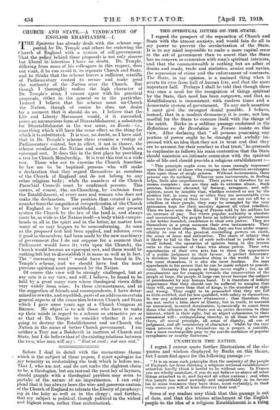CHURCH: AND STATE.—A VINDICATION OF ENGLISH ERASTIANISM.—I.
T' Spectator has already, dealt with the scheme sup ' - portedby Dr. Temple and others for. endowing the Church of England with a system of self-government. That the. policy behind these proposals is not only sincere, but. liberal. in intention I have no doubt. Dr. Temple, differing. from some of his colleagues in this. respect, does. not want, if he can avoid it, to separate Church and State, and he thinks .that. the scheme leaves a sufficient scintilla. of Parliamentary control to secure and make good; the authority of the Nation over the Church. But though. I thoroughly realize . the, high character of Dr. Temple's aims, I cannot agree with his practical proposals, either in. the general , or in the particular. Instead .I believe that his scheme must un-Church. the Nation, though- of, course he does not desire. for a moment that it shradd.do so. I believe that the, Life and Liberty Movement would, if it succeeded, prove an unconscious form of Disestablislunent, a substitute- for Disestablishment, in the war sense, an Ersatzi.e., something which will have the same effect as the thing for • which it is substituted: It is true„nocloubt, as I have said, that in. Dr. Temple's scheme there remains a vestige of Parliamentary. control, but in effect, if not. in theory, the scheme secularizes the Nation. and makes. the Church an episcopal seat. It does this.in the first place by providing: a test for Church Membership. It is true this test is a wide test. Those who are to exercise the Church franchise by law. are to be baptized. persona whq will make a declaration 'that. they regard. themselves as members of the Church of 'England and do not belong to any other religious body ; while the members of the Church Parochial Councils must be. confirmed persons. This means, of course, .the, un-Churching„ by exclusion from the Establishment, of every man and woman who does not make the declaration, The position thus created is poles asunder from the 'magnificent comprehension of the Church of England as by law established. Under our present system the Church by the law of the land -is, and always must be, as wide as the Nation itself—a body whith-compre- heads us all in the spirit and in the letter, no..matter how many of us may happen to be nonconforming. As soon as the proposed test had been applied,. and reforms, even if good in themselves, had been made by the new machinery of government (for I do not suppose for a moment that Parliament would force its veto. upon the Church), ,the Church would become an episcopal sect, and there.wouldbe nothing-left but to disestablish it in name.as well as infect. The uncreating word" would have been found' in Dr. Temple's scheme, and we should have lost the most precious spiritual asset possessed by the Nation.
Of course this view will be strongly challenged, but at
any rate it is my view, and believe, be found to be held by a great many men whose theological views differ very widely from mine. In these circumstances, and at the suggestion of friends and correspondents, I have deter- mined to rewrite, and republish, parts of an address on certain general aspects of the connexion between Church and. State which I gave some years age at a Church Congress.. at Barrow. My object is to ask those who. have to make up their minds in regard to a scheme so attractive- per se as that of. Dr. Temple to consider whether. it is not going to destroy the Establishment and un-Church the Nation in the name of better Church government. I am neither a Tory nor a Bolshevik. in matters of Church and State, but I do believe that of the existing relations between the two, wise men will* say: "Sint ut aunt; cut non sint."



































 Previous page
Previous page